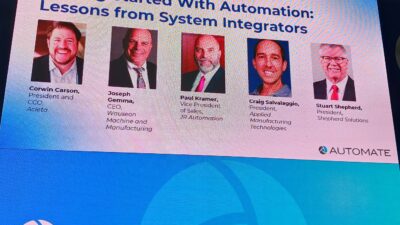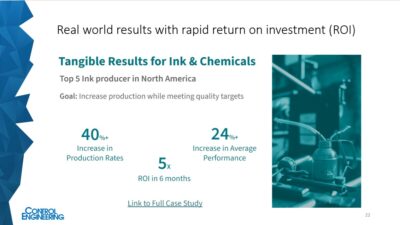Proliferation of low-cost, high-tech automation equipment has left some end-users in a quandary. How can they take advantage of the latest automation technology without investing their own time and effort to stay abreast of every new development? How can they benefit from all these new hardware and software products if their in-house engineering staff is already too busy to use them? More...
|
Proliferation of low-cost, high-tech automation equipment has left some end-users in a quandary.
How can they take advantage of the latest automation technology without investing their own time and effort to stay abreast of every new development? How can they benefit from all these new hardware and software products if their in-house engineering staff is already too busy to use them?
More and more, the answer seems to be "system integrators."
Automation system integrators are contract engineering firms that can design and implement automated production facilities for end-users lacking resources to do the job themselves. System integrators bring specialized engineering skills to automation projects and can supplement the end-user’s often understaffed engineering department.
It is the integrator’s job to keep up with the latest technology trends and provide the best solutions for the end-user’s automation problems.
Some integrators specialize in just the design phase of a project; others provide implementation and start-up services as well. "Turnkey" system integrators can handle the whole project from start to finish.
Where to look
There are as many varieties of system integrators as there are systems to integrate. Even turnkey integrators tend to specialize certain industries or certain applications—such as discrete, continuous, or batch automation projects. Finding the right integrator for a particular job can be as simple as asking the competition who it was that automated their facility (if they’ll tell you), or it can involve a bit of sleuthing.
The "Information Maze" graphic shows several paths that end-users have followed to locate system integrators qualified to handle their automation projects. Perhaps the most common route through the maze starts at the top and proceeds clockwise. End-users already familiar with a particular vendor’s products generally start their search by asking the vendor or their local distributor for help. At one time, most of the larger automation vendors would reply with offers of assistance from their own application engineering departments. Some—including Honeywell (Phoenix, Ariz.), The Foxboro Company (Foxboro, Mass.), and Fisher-Rosemount Systems (Austin, Tex.)—still do.
Today, however, more and more vendors are turning to their networks of system integrator partners to provide the engineering services required for an automation project (see "Partnerships Help End-Users Automate," Control Engineering , mid-December 1997).
Some vendors respond to a request with information about several partners that the end-user can contact directly. Other vendors forward the end-user’s request to all of their partners so they can contact the end-user. Occasionally, the vendor selects the best partner for the job with an invitation to participate in a joint effort to supply all required equipment and services together. Many of the smaller integrators with limited promotional budgets rely heavily on vendor referrals for new clients.
Other options
The counter-clockwise route through the maze is somewhat less traveled. End-users sometimes find the integrators they’re looking for directly, either through word-of-mouth advertising or by returning to integrators they’ve used before. If the end-user does not already have a brand preference for the project, the chosen integrator may contact a vendor that can provide the necessary equipment.
Rarely will an integrator forward a project’s requirements to a predetermined vendor. Integrators value their freedom to assess a project objectively and to recommend the best products for the job.
The "Information Maze" illustrates how some equally useful, but unsolicited, information about system integrators can reach the end-user. Trade magazines publish a variety of articles, advertisements, and directories based on information collected from vendors and integrators.
Control Engineering publishes the Global System Integrator Database [formerly called the Automation Integrator Guide, and before that, the Automation Register] every December. With the printed and on-line versions of the Global System Integrator Database, end-users can locate system integrators by industries served, areas served, engineering specialties, product experience, and corporate affiliations. The table shows a sample profile.
Referral services
Several trade organizations also serve as clearing houses for information about system integrators in their respective automation disciplines.
The Control System Integrator Association (CSIA) will even check its membership roster for integrators that meet an end-user’s specific requirements. This free service is available through the CSIA’s web site at www.controlsys.org .
Of course, finding the best candidates for integrating an automation project is only the first step towards getting the job done. Making the final selection and deciding how to proceed from there can be even more challenging. The next article in this edition examines some of the issues that need to be addressed up front.
Qualified system integrators may update or create listings in the Control Engineering Global System Integrator Database at
https://gspplatform.cfemedia.com/si/
ON-LINE SEARCH FACILITY
Control Engineering’s on-line search facility at
Company name and address;
Telephone and fax numbers;
E-mail and home-page addresses (where applicable);
Industries and geographic areas served;
Engineering specialties, product experience, and corporate affiliations; and
A corporate resume describing the integrator’s background and capabilities.
Source: Control Engineering
Links updated Aug. 15, 2014.



